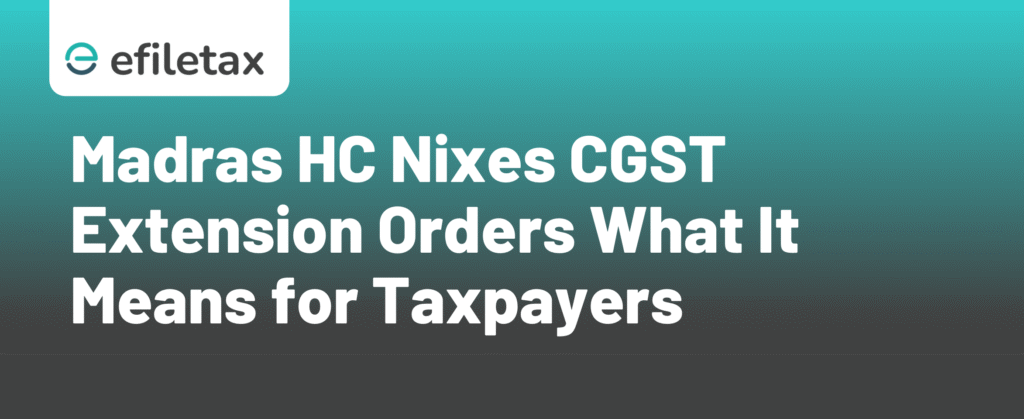
Summary
The Madras High Court has invalidated CBIC’s extension of limitation periods under Section 168A of the CGST Act for FY 2017–18 cases. This ruling has major implications for GST demands raised post the original time limit.
Introduction
CGST Section 168A notifications quashed — that’s the recent verdict of the Madras High Court which has stirred up debate among GST professionals and taxpayers. In a landmark judgment, the court ruled that CBIC exceeded its powers by extending limitation periods for issuing notices related to FY 2017–18.
Background: What Is Section 168A of CGST Act?
Section 168A was introduced during COVID-19 via the Taxation and Other Laws (Relaxation of Certain Provisions) Act, 2020.
It empowered the government to:
- Extend timelines for actions or proceedings under GST
- Only in view of the pandemic or disasters
- But not beyond the outer time limit specified in the Act itself
🛑 Key Point: Section 168A was not a license to reopen time-barred cases.
What Did CBIC Do? The Extension Notifications
CBIC issued a series of notifications:
- Notification No. 13/2022–CT dated 5 July 2022
→ Extended time limits for issuing notices under Section 73 (non-fraud cases) - This allowed GST officers to issue show cause notices (SCNs) for FY 2017–18 beyond the original June 2022 deadline
Madras HC Ruling: What the Court Said
In M/s. Ramco Cements Ltd. vs Union of India [2024], the Madras High Court held:
- Section 168A cannot be used to override the statutory limitation under Section 73(10)
- The limitation for FY 2017–18 expired on 30.06.2022
- CBIC has no legislative authority to extend this through notifications
- The extension notifications are ultra vires and hence invalid
Legal Impact: Why This Case Matters
- Time-barred cases (FY 2017–18) cannot be reopened now
- Thousands of GST SCNs issued post 30 June 2022 may now be invalid
- May trigger a wave of writ petitions challenging such notices in other states
- Brings clarity on separation of legislative vs executive power in GST law
Expert View: What Tax Practitioners Should Do Now
🔍 Review all notices issued for FY 2017–18
📂 Maintain detailed records of when SCNs were received
📜 File writ petitions where notices are based solely on the extended limitation
“This judgment reasserts that delegated legislation cannot override express provisions of the CGST Act,” says CA Anirudh S, GST practitioner, Chennai.
Internal Comparison Table
| Aspect | Original Rule | Post Notification | HC Verdict |
|---|---|---|---|
| Limitation for FY 2017–18 | Up to 30 June 2022 | Extended till 30 Sept 2023 | Held invalid, only up to 30 June 2022 |
| Source of Power | CGST Section 73(10) | Section 168A + Notification 13/2022 | Section 73 prevails |
| Validity of Notices | Valid if within time limit | Many issued post-deadline | Now quashed as time-barred |
FAQs
Q1. Can this ruling be applied pan-India?
No. While binding in Tamil Nadu, it can influence other High Courts. If appealed, Supreme Court may issue a final word.
Q2. What should a taxpayer do if they received a notice post 30.06.2022?
Consult a tax professional. Consider challenging the notice via writ petition.
Q3. Are fraud-related cases also impacted?
No. This case pertains to Section 73 (non-fraud cases). Fraud cases under Section 74 have a different timeline.
Conclusion
The Madras HC ruling on CGST Section 168A extension underscores the need for strict statutory compliance in issuing GST notices. If your business has received such notices beyond the prescribed period, consult Efiletax experts for legal remedies.